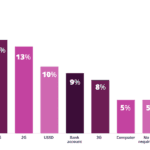The Rise of Embedded Finance in Africa: Three Fintech Innovators Highlight its Potential to Boost Financial Inclusion and Business Growth on the Continent
In Egypt, as in many African countries, there has been ongoing movement in recent years towards financial inclusion, digitisation and the fintech sector. The latest report from the Central Bank of Egypt indicates that these efforts are gaining momentum, as total ownership of transactional accounts has reached 64.8%. And the volume of electronic transactions in the Egyptian market increased to over EGP 6.4 trillion (US $207 billion) in 2022, up from EGP 4.2 trillion ($136 billion) in 2020.
The growth of digital payments and other fintech tools, and the regulatory progressiveness that has enabled it, are not only increasing financial access, they’re powering the business models of countless innovative companies across the country and the broader region.
One of the key ways fintech is reshaping business — both in Egypt and across emerging markets — is through the rise of embedded finance. The term refers to the placement of a financial product in a non-financial product, customer experience or platform. Examples of embedded finance include digital payment options or credit offerings that facilitate the purchase of specific products, or insurance that protects against damage to a newly purchased device. The development of embedded finance is revolutionising business operations across various sectors, particularly impacting businesses that would not traditionally have access to these financial services, like startups and small and medium-sized enterprises (SMEs).
At Nclude — an investment firm focused on fintech innovation and financial inclusion — we’re working with a number of portfolio companies that are incorporating embedded finance into their businesses. These companies provide a glimpse of the impact this emerging approach can make, not only in Egypt but in other economies across Africa and around the world.
In the article below, I’ll discuss how these local trailblazers are leveraging embedded finance to boost Egypt’s economy and provide a catalyst for digitisation and growth among other businesses, in sectors ranging from hospitality to agriculture and pharmaceuticals.
Embedded Finance Solutions in the Hospitality Sector
Embedded finance provides an effective solution to challenges within Egypt’s hospitality sector, including hotel, restaurant and catering businesses. Traditionally, these businesses have faced issues surrounding working capital financing and payment friction for the purchase of supplies. They generally must purchase their supplies from different vendors, making it hard to get complete visibility into the availability and pricing of various goods. Traditional payment procedures — i.e., those involving cash and checks — are often time-consuming and strenuous, eliminating the possibility of seamless transactions between these companies and their suppliers. Credit is also often difficult for these businesses to access, since many of them struggle to obtain suitable payment terms or working capital facilities, due to their size and the often-lengthy procedures of formal lenders in Egypt. In response, I believe the hospitality industry in Egypt must leverage embedded finance solutions to enhance these businesses’ credit management and payment procedures. By integrating these solutions into their platforms, businesses can revolutionise their operations and transform customer experiences.
One compelling example of the impact embedded finance can make in this sector is OneOrder, a technology-enabled supply chain platform catering to hospitality businesses. Recognising the value of embedded finance, it has optimised these businesses’ working capital by offering flexible credit terms to small and medium-sized merchants and restaurants, which are often left out of traditional financing options. But this credit doesn’t come in the form of traditional loans from OneOrder. Instead, these businesses get their “financing” as inventory: OneOrder provides the goods first without requiring payment up front, allowing the businesses to gradually pay off this inventory after they’ve sold it to end customers over the course of an agreed-upon time frame.
By facilitating access to working capital, supply chain financing, and logistics and delivery directly within its online platform, OneOrder helps users buy supplies, track their spending and manage their inventory more effectively, fostering growth and stability. The company has also introduced real-time order tracking and embraced cashless payments, simplifying the overall transaction process. These innovations not only alleviate payment friction, they also contribute to enhanced operational efficiency and improved satisfaction among OneOrder’s customers.
Empowering Agriculture Businesses to Leverage Financial Services
In Africa, agriculture is a cornerstone of both local and national economies. For instance, in Egypt, smallholders are responsible for producing nearly half of the country’s essential crops. However, farmers across the region face growth constraints and a lack of awareness of — and access to — financial services. At Nclude, we are facilitating and encouraging robust collaboration between the government and the private sector to address these challenges, focusing on providing extensive support to farmers and encouraging them to leverage embedded finance to access credit and other financial services that can accelerate their growth.
One business we’ve invested in is Mozare3, an innovative agri-fintech firm dedicated to optimising the value chain around Egyptian farmers by providing input financing, buying their crops, and increasing their access to crop storage and processing and financial services. The company has incorporated embedded finance into its business model, granting its farmers efficient access to credit for a multitude of purposes, with the goal of enhancing the output of farms and improving the livelihoods of farm owners. Along with input financing and digital wallets that help farmers build a credit score, Mozare3’s embedded finance offering also includes crop insurance and agricultural equipment leasing, all of which helps boost farmers’ productivity and resilience in the face of climate change and economic uncertainties. The offering even features agronomy support, through which Mozare3’s agronomists advise farmers on what to plant (and when), improving outcomes throughout the whole value chain.
Providing Financing Solutions for African Pharmacy Businesses
Another Nclude portfolio company that’s leveraging embedded finance is Grinta, a business-to-business managed marketplace which supplies the products sold by pharmacies. Small pharmacies often face the same pain point as SMEs in other sectors: a lack of access to financing to purchase inventory and optimise their cash cycles. Grinta addresses these issues by offering its clients working capital finance and data analytics, which enable them to grow their revenues and optimise their operations.
In delivering these services, the company has emerged as a disruptive financing solution in the Egyptian (and soon to be African) pharmaceutical supply chain. With 3,300 active pharmacies using the platform, Grinta helps ensure that their shelves are well and appropriately stocked, and that any and all of their working capital needs are met.
Credit and Debt Offerings — And Beyond: The Growth of Embedded Finance
Currently, embedded finance in Egypt (and to a similar extent Africa) has primarily been centred around credit and debt offerings. For instance, we are seeing e-commerce platforms collaborate with financial institutions to offer instant loans to customers at checkout. Similarly, ride-hailing services are extending credit to drivers, enabling them to purchase fuel or maintain their vehicles. These credit and debt-based embedded finance solutions have played a crucial role in increasing financial inclusion for underserved populations who lacked access to traditional banking services in Egypt. And similar models are emerging across the continent.
As providers build upon these services, embedded finance has the potential to transform various aspects of daily life by offering a diverse array of financial services beyond credit and debt offerings. By integrating financial solutions — from pay-as-you-go services and loyalty programs, to gig economy payments, personal financial management tools and microinsurance services — into businesses in various sectors, embedded finance can foster financial inclusion, improve access to essential services, and drive economic growth and financial sustainability in the region.
Basil Moftah is a General Partner at Nclude.
Photo credit: Cinty Ionescu
- Categories
- Finance



